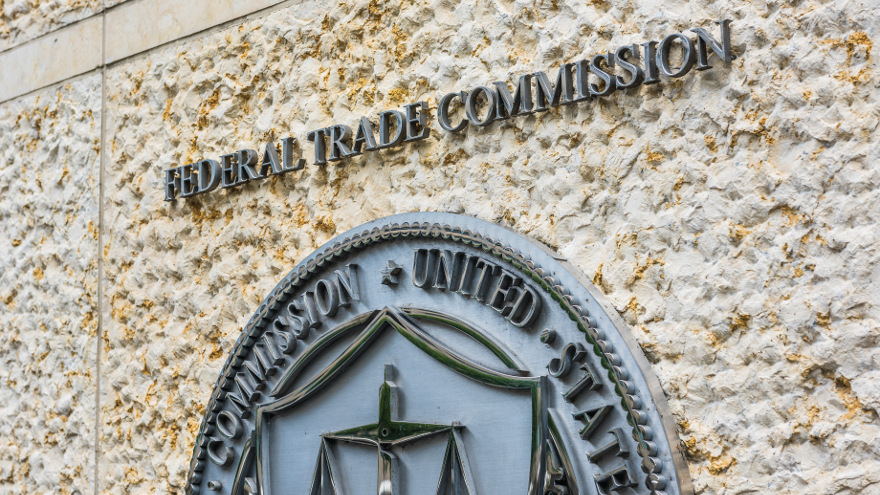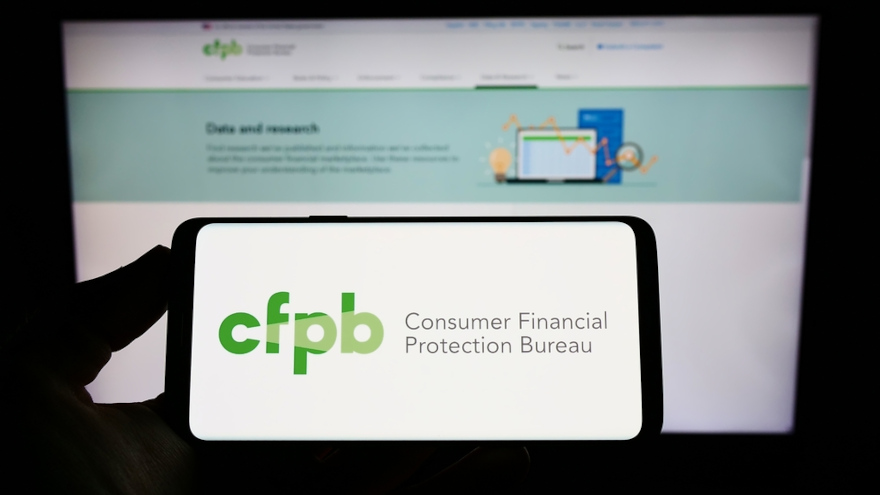Two of the senior vice presidents from the American Financial Services Association took time during their orchestration of the 2023 Vehicle Finance Conference in Dallas for this episode of the Auto Remarketing Podcast.
Celia Winslow and Danielle Fagre Arlowe discussed the latest developments on the federal and state level, respectively, in connection with actions by lawmakers and regulators.
To listen to the conversation, click on the link available below.
Download and subscribe to the Auto Remarketing Podcast on iTunes.
Consumer Bankers Association president and CEO Lindsey Johnson offered a pointed response to a specific part of President Joe Biden’s State of the Union address given on Tuesday night.
It all had to do with what Biden referred to as “junk fees.”
The president told the nation: “Junk fees may not matter to the very wealthy, but they matter to most folks in homes like the one I grew up in. They add up to hundreds of dollars a month. They make it harder for you to pay the bills or afford that family trip,” Biden said.
“I know how unfair it feels when a company overcharges you and gets away with it. Not anymore,” he continued and then referenced the Junk Fee Prevention Act, which the White House predicted as potentially saving consumers as much as $9 billion a year in late fees.
After listening to the president, Johnson offered these remarks through a news release.
“As the nation continues to grapple with ongoing economic headwinds, consumers are spending more and making less. According to a recent survey, nearly 70% of workers are unable to cover an emergency $400 expense with savings alone. Continuing to conflate fees charged by banks to extend credit to consumers, with those in other sectors of the economy, fails to recognize the fact that banks operate in the most competitive, well-regulated industry in the world and are required by law to provide clear disclosures aimed at empowering consumers to make informed financial decisions,” Johnson said.
“Further, these statements do not reflect the reality that Americans today rely on bank products and services more than ever to meet their needs – whether to pay their rent, fill up their gas tank, or simply put food on the table,” she continued.
“Instead of mischaracterizing an entire industry, policymakers across the ideological spectrum should work in tandem with banks to find durable solutions to the economic challenges we face as a nation, including expanding consumers’ access to the financial tools they demand and deserve. Together, we can make a meaningful difference in the lives of all those who are counting on us,” Johnson went on to say.
It might be a different elected official serving as the attorney general in Massachusetts, but the top member of the commonwealth’s law enforcement establishment took two swift actions in the automotive space within the space of four days last week.
Massachusetts attorney general Andrea Joy Campbell announced a settlement reached with Toyota Motor Credit Corp. to resolve allegations of certain illegal auto finance collection practices, securing more than $7.6 million, including approximately $5.5 million in debt relief.
More than 500 borrowers across the state are expected to be eligible for relief under the settlement.
And earlier in the week, Campbell announced that her office has reached a $350,000 settlement with Hometown Auto Framingham to resolve allegations that the company engaged in the unfair, deceptive and discriminatory pricing of “add-on” products sold to Black and Hispanic consumers.
According to a news release, the assurance of discontinuance, filed on Jan. 17 in Suffolk Superior Court, alleged that Toyota Motor Credit failed to give certain consumers sufficient information about the calculation methods for deficiencies left on their installment contracts after their vehicles were repossessed.
The settlement also alleged that Toyota Motor Credit made excessive collection calls to certain consumers, in violation of the AG’s debt collection regulations.
“Consumers facing repossession and collection actions on their vehicles deserve clear and transparent information from auto lenders,” Campbell said in the news release. “It is our hope that the debt waiver and funds secured through this settlement will assist hundreds of residents in getting the relief they need and deserve — and build on our efforts to provide economic opportunity to families across Massachusetts.”
The development associated with Toyota’s captive is the latest in a string of settlements with finance companies and the Massachusetts AG.
The AG’s Office previously pursued Credit Acceptance Corp. for failing to provide similar information to after auto repossession; a claim was part of a much broader suit against the subprime auto finance company relating to unfair lending, collection and securitization issues.
In August 2020, the AG’s office sued Credit Acceptance and announced a settlement in September 2021 for more than $27 million in cash as well as debt forgiveness and credit repair for affected consumers.
Last year, the AG’s office entered into a $5.6 million assurance of discontinuance with Santander Consumer USA relating to its alleged failure to provide post-repossession information to consumers.
Meanwhile, Campbell has led the charge against dealerships in Massachusetts, too, according to another news release.
Another assurance of discontinuance, also filed in Suffolk Superior Court, alleged that Hometown Auto, which operates two dealerships located in Wellesley and Danvers, charged Black and Hispanic consumers higher prices for “add-on” products in comparison to white consumers.
In 2018, the AG’s office began an investigation into discriminatory pricing of “add-on” products at Massachusetts auto dealerships, including Hometown Auto. The AG’s office determined that Hometown charged higher prices to its Black and Hispanic consumers for the same “add-on” products sold to white consumers.
The AG’s office alleged that Hometown’s conduct violated the state’s Consumer Protection Act, which prohibits unfair or deceptive acts and practices in trade or commerce.
Under the terms of the settlement, Hometown has agreed to pay $350,000, with $200,000 to be allocated to provide restitution to harmed consumers. The dealerships also must enact several business practice changes in order to decrease the likelihood of pricing disparities in the future. Some of these changes include:
—Providing staff training on implicit bias and the obligation not to discriminate when pricing products.
—Requiring disclosure of “add-on” product pricing to provide transparency on the price of any add-on product offered to consumers.
—Improving oversight of “add-on” product pricing by implementing a standardized pricing policy for “add-on” products that limits when and why staff may deviate from such prices and requires documentation and oversight for pricing deviations.
—Providing compliance monitoring information to the AG’s Office concerning future “add-on” product sales.
This matter is part of an ongoing investigation into Massachusetts dealerships concerning the pricing of “add-on” products.
In September, the AG’s office announced a lawsuit against Jaffarian Volvo Toyota of Haverhill, for charging Black and Hispanic consumers hundreds of dollars more, on average, than white consumers for “add-on” products.
“Consumers need to know that their race or ethnicity will have absolutely no effect on the type of service they receive from Massachusetts auto dealerships or the prices they will be charged,” Campbell said in the other news release.
“My office is committed to protecting consumers from predatory and discriminatory practices that stand in the way of upward mobility, and we will continue our advocacy to ensure all consumers are being charged for services equally and fairly,” she went on to say.
Rick Hackett said F&I Sentinel is “doing all the right things,” so the former Hudson Cook partner and assistant director of Consumer Financial Protection Bureau (CFPB) decided to move from an advisor to a member of the compliance service provider’s board of directors.
According to a news release distributed last week, F&I Sentinel’s move with Hackett is effective immediately, as its board of directors unanimously approved Hackett’s nomination.
Hackett now is F&I Sentinel’s seventh external board member.
“As a highly respected advisor, Rick provides invaluable insights and guidance to our Board and team,” F&I co-founder and CEO Stephen McDaniel said in the news release. “His expertise and knowledge in auto financing policy and compliance, coupled with his experience and familiarity working within the CFPB, have enhanced our product and service offerings, ultimately benefiting our customers. When given the opportunity to have Rick join our Board, we jumped at the opportunity to further expand his role with our company.”
Hackett focused on auto finance regulation while serving at the CFPB under former director Richard Cordray. His responsibilities included advising all CFPB divisions on market information and policy issues in the installment and specialty lending areas, including vehicle financing.
Hackett helped lead the CFPB’s initial charter into the auto finance industry, tasked with guiding strategy for examining and investigating dealer participation programs.
Hackett spent 31 years practicing law before joining the CFPB in 2011. He left that agency in 2013, and the next year joined Hudson Cook. He retired from Hudson Cook in 2019 and currently serves as an advisor and board member for several companies, including F&I Sentinel.
“I saw the writing on the wall and spoke at an industry conference in 2014 about the need for auto finance companies to adopt and execute a comprehensive compliance solution to meet emerging regulatory requirements and policies,” Hackett said.
“After serving as an advisor to F&I Sentinel since last May and seeing how F&I Sentinel’s innovative products and services meet this growing need, it was an easy decision to join the company’s board. It’s doing all the right things,” he went on to say.
Last week, Informativ announced a new, complete, and proactive credit and compliance offering.
The service provider that includes Credit Bureau Connection (CBC), Dealer Safeguard Solutions and CreditDriver said this revamped solution brings together innovative, mobile-first consumer credit prequalification and lead generation,
This proactive vehicle sales compliance solution that protects dealerships from costly violations of the FTC’s expanded Safeguards rule, as well as reliable and comprehensive credit reporting and compliance support.
“A great deal is at stake for dealerships as they navigate new and expanded FTC guidelines,” said Informativ CEO David Carner, whose company provides more than 7,000 automobile dealers and other businesses with credit-focused lead generation, credit reporting and compliance solutions.
“Our technology works together from the moment a lead is captured using QR code technology and the consumer’s mobile device identification, to deliver enriched data to dealerships, protect against fraud and enforce a complete and proactive compliance process, both in-store and online, from the sales floor to F&I, and beyond, so dealers can stop hoping they’re compliant, and instead, start knowing they’re compliant,” Carner continued in a news release.
Informativ’s credit and compliance technology, Credit Bureau Connection and Dealer Safeguard Solutions, are geared to enable a proactive, consistent and enforceable process on in-store and remote deals that protects consumer data, follows federal guidelines, prevents dealerships from violations that can result in devastating fines, and supports a seamless, faster sales process as there is less paperwork to handle.
Andy Graff is chief technology officer and vice president of innovation at Galpin Motors.
“My team says, ‘Please, whatever you do, don’t take it (Dealer Safeguard Solutions) away because it’s helping us sell cars faster, more compliant’,” Graff said in the news release. “It’s also creating a great experience for our customers.”
Informativ added that its lead generation and prequalification technology focuses on a mobile-first experience, which can lead to 30% higher conversion rates compared to website prequalification.
By leveraging a buyer’s mobile phone carrier data once a dealership’s unique QR code is scanned, information can be quickly and easily collected and provided to the dealership, including the lead source.
“Attaching Informativ’s QR code technology to our existing advertising has been a gamechanger,” said Mike Lopretta, general manager of Razzari Ford. “We picked up 58 additional leads on our first campaign alone.”
Visit www.informativ.com for additional information.
The American Recovery Association (ARA) recently released a policy statement associated with the revamped Safeguards Rule set to be implemented by the Federal Trade Commission in June.
In connection with the mandate, ARA specifically believes recovery professionals should engage in the following best practices:
● Immediately after recovery, cut new keys to the vehicle
● Once keys are cut, access the vehicle to retrieve, inventory, and securely store all personal effects
● Eliminate all consumer information from the vehicle’s computer or other electronic repository or database accessible through the vehicle
ARA then said that every subsequent custodian of the vehicle along the chain of custody should, as a matter of best practice, verify that all consumer information has been eliminated from the vehicle and take responsibility for removing any remaining consumer information before the vehicle moves to the next custodian.
The association recommended its members work together with their finance company and servicer clients to establish compliance protocols and ensure all custodians participate in consumer-protection processes.
“ARA expects that many lenders and servicers that issue recovery assignments share ARA’s concern about these important consumer-protection and regulatory issues, and will support the best-practices points above in working together with ARA members to implement them. That said, there may be lenders or servicers that do not share ARA’s position,” the association said in a news release.
ARA strongly urged members to consider the following issues when working with finance companies and servicer clients when it comes to the FTC Safeguards Rule, as well as any other statute, regulation, or law that governs the protection of consumer data and privacy:
● Do you understand the finance company’s or servicer’s internal processes for protecting consumer data and property during their respective stages of the repossession process, including, but not limited to, eliminating consumer data from vehicle computers and other electronic repositories and databases accessible through the vehicle?
● Have you obtained written assurance that the lender or servicer has such internal processes and that those processes will be applied to assignments you will be working? Does your service agreement delineate responsibility for protection of consumer data and privacy between the parties based on their custody of the vehicle?
● Does your service agreement contain any representations or warranties about the lender or servicer compliance protocols for protecting consumer privacy or consumer data while the vehicle is in their custody?
● Are there opt-out, waiver, indemnification, or hold harmless provisions in your service agreement? Do they speak to the issue of protecting consumer privacy and consumer data and whose responsibility that is at the various stages of the repossession process based on the chain of custody?
“The long-and-short is this: ARA members conduct themselves with consumer interests in mind,” the association said. “That includes these critical privacy and data protection issues, which are implicated by the FTC’s Safeguards Rule. To the extent the rule applies to recovery professionals, the industry must stay vigilant to ensure compliance.
“This policy statement is not legal advice, nor a substitute for legal advice. ARA cannot give you legal advice. You must work with your internal or outside counsel to determine the appropriate course of action with respect to the issues discussed in this policy statement,” the association went on to say.
Recent developments from both federal- and state-level law enforcement include matters associated with refunds connected to guaranteed automobile protection (GAP) as well as a dealership defrauding consumers.
Connected to industry-wide compliance challenges highlighted multiple times by Allied Solutions, Colorado attorney general Phil Weiser recently announced that his office secured $4 million in refunds for Colorado residents who were entitled to refunds of GAP fees from Bellco Credit Union and Canvas Credit Union.
According to a news release, an investigation by the Consumer Protection Section in the Colorado Department of Law revealed that Bellco and Canvas historically were not refunding unearned GAP fees owed to consumers after either the retail installment contract was paid off or the vehicle was repossessed.
In the settlement, Bellco and Canvas also agreed to refund GAP fees to consumers in a timely manner in the future.
“When hardworking Coloradans pay for GAP coverage, they deserve to receive what they are owed,” Weiser said in the news release. “My office will continue to hold accountable companies that violate the law and leave Coloradans without the money they were due.”
This latest settlement is part of Weiser’s broader efforts related to GAP, resulting in total refunds to consumers of $23.5 million.
Allied Solutions discussed how credit unions and other finance companies can avoid these pitfalls both through this podcast recorded during Used Car Week 2022 in San Diego as well as this free, in-depth webinar.
Wisconsin dealer sentenced in federal court
U.S. Attorney Gregory Haanstad of the Eastern District of Wisconsin recently announced that John Solberg of Suamico, Wisc., was sentenced to 30 months in federal prison by Senior United States District Judge William Griesbach.
According to court records, Solberg established Backwoods Bargains, an independent dealership located in Suamico in 2012. Ultimately, the dealership was renamed Standard Pre-Owned, and Solberg opened a second location in Kaukauna, also named Standard Pre-Owned.
While operating his dealerships, court records indicated Solberg developed a scheme to defraud individuals that listed their vehicles for sale on Craigslist.
Officials said Solberg would contact these individuals and offer to sell their vehicles on consignment from his lots.
Court records indicate that Solberg then would sell the consignment vehicles without paying the owners of the vehicle and would provide fraudulent vehicle titles to the purchasers.
“At sentencing, Senior Judge Griesbach noted the serious nature of Solberg’s scheme based on the emotional and financial toll he imposed on his victims,” officials said in the news release. “He also questioned whether Solberg truly accepted responsibility for his criminal acts.”
Though Solberg requested a sentence of probation, the judge determined that a 30-month term in federal prison was required to address the magnitude of the crime and to send a message to Solberg and others that taking advantage of people will result in serious consequences.
After serving his prison sentence, officials said Solberg will spend three years on supervised release.
The court also ordered Solberg to pay approximately $290,000 in restitution to his victims.
Credit Acceptance responded to a robust lawsuit brought by the Consumer Financial Protection Bureau and the New York attorney general on Wednesday triggered by an investigation that began in May 2019.
New York attorney general Letitia James and the CFPB said through a news release that they are suing Credit Acceptance “for deceiving thousands of low-income New Yorkers into high-interest car loans.”
Credit Acceptance responded through a filing with the Securities and Exchange Commission on Wednesday afternoon, saying that “the complaint seeks injunctive relief, an accounting of all consumers for whom the company provided financing, restitution, damages, disgorgement, civil penalties, and payment of costs. We cannot predict the eventual scope, duration or outcome of this lawsuit at this time. As a result, we are unable to estimate the reasonably possible loss or range of reasonably possible loss arising from this litigation.
“The company intends to vigorously defend itself in this matter,” Credit Acceptance added in the filing.
According to the news release from the AG and the CFPB, they said Credit Acceptance misstated key terms on contract agreements, including the principal and interest amounts, and did not disclose thousands of dollars in credit charges.
Officials recapped their investigation found that while Credit Acceptance’s contracts in New York claimed an annual percentage rate (APR) of 22.99% or 23.99%, they said they found the finance company charged more than 38% APR on average.
“And on numerous occasions charged more than 100 percent APR,” officials said.
As a result of what officials attributed to the interest rate, the CFPB and the attorney general said nearly 90% of New York contract holders became delinquent on their payments at some point, “often leading to additional fees that added to the cost of their already expensive car loans.
“More than half of New York borrowers failed to repay their loans by the terms of the loan agreements, with 44 percent of New York borrowers experiencing repossession at some point,” officials continued in the news release.
The CFPB and the attorney general then offered an instance of why they brought this lawsuit.
“As an example of CAC’s typical business practices, one consumer, who supports two minor children, signed up for a CAC loan requiring her to pay more than $13,000, despite the dealer needing only $5,614 to sell her the car. After she paid more than $7,600 to CAC, they repossessed her vehicle, sold it at auction, and sued her for more than $7,500,” they said.
“The lawsuit alleges that CAC projected, down to the penny, how much money it could extract from borrowers through loan payments, late fees, repossession and auction, debt collection, and wage garnishment, without considering a consumer’s ability to repay their loan,” officials continued. “CAC then offered to split the projected collections with its affiliated dealers. Through this practice, CAC ensured that as long as it collected the projected amount, both CAC and the dealer would profit — even if the borrower ended up in delinquency, default, or had the vehicle repossessed.”
The news release mentioned how Credit Acceptance involved dealerships and investors in its activities triggering the legal action.
“In addition, the lawsuit alleges that CAC cut deals with its affiliated dealerships and assisted them in misleading consumers by including costly add-on products in their purchases,” officials said. “Despite receiving repeated complaints that its dealers fraudulently told consumers that these products were required and that dealers even included the products without the consumer’s consent, CAC took no action to stop this. Instead, CAC continued to incentivize its dealers to push these products and actually adopted e-signing practices that made it easier for dealers to include the products with little or no notice to consumers.
“The final step in CAC’s deception was to unload a large proportion of the loans onto unsuspecting investors, packaging the consumer loans into securities,” officials continued. “In creating, marketing, and selling these securities, CAC represented to initial purchasers, rating agencies, and investors who purchased the securities that the underlying loans complied with applicable law. However, these representations were false, and the lawsuit alleges that CAC’s statements constituted securities fraud under New York’s Martin Act.”
In its filing with the SEC, Credit Acceptance recapped the subpoenas and civil investigative demands the finance company has received from both the New York attorney general and the CRFB. Credit Acceptance said it pushed back multiple times against what the CFPB sought through these demands, using the opportunity through a Notice and Opportunity to Respond and Advise (NORA) letter, “disputing that it had committed any violations.”
Credit Acceptance closed its SEC filing by reiterating, “We cannot predict the eventual scope, duration or outcome of the lawsuit at this time. As a result, we are unable to estimate the reasonably possible loss or range of reasonably possible loss arising from the lawsuit. The Company intends to vigorously defend itself in this matter.”
James, the New York AG, and CFPB director Rohit Chopra each elaborated why they’re taking this legal action.
“CAC claimed to help low-income New Yorkers purchase cars, but instead, drove them straight into debt,” James said in the news release. “CAC steered hardworking New Yorkers toward financial ruin by tricking them into unaffordable, high-interest auto loans while cutting backroom deals with dealers to protect their own profits. These predatory actions hurt innocent people and left them with mountains of debt. I thank the CFPB for their partnership to stop this harm and protect everyday New Yorkers.”
Chopra added, “Credit Acceptance obscured the true cost of its loans to car buyers, leading to severe financial distress for borrowers and subjecting them to aggressive debt collection tactics on loans its own systems predicted that borrowers can’t afford to repay. The CFPB’s action with the New York Attorney General seeks to end Credit Acceptance’s unlawful practices and makes consumers whole.”
Perhaps one segment of the annual report generated by the ombudsman of the Consumer Financial Protection Bureau might be of particular interest to auto finance companies and their compliance departments.
During the last fiscal year, the CFPB ombudsman launched its post-examination survey of supervised entities, which was aimed to serve as “a confidential avenue for supervised entities to share their feedback and recommendations on the CFPB examination process after participation in a supervisory examination.”
Then the ombudsman’s office was supposed to provide survey participants’ unattributed feedback and recommendations to the CFPB.
The survey focused three areas:
—Supervision materials and resources: Includes topics such as information availability, functionality, and content for review by entity representatives who will engage with any part of the examination.
—Interpersonal communications: Includes communications between entity representatives and anyone at the CFPB before, during, or after an examination, using any medium or format.
—End of the examination: Includes topics such as timing, knowledge of outcomes or resolutions, clarity in expectations of closure, and awareness of the appeals process.
In the annual report, the CFPB ombudsman broke down findings in each of those areas, along with what did and did not work well to go with potential changes. Here are those details:
Supervision materials and resources
What worked well?
• Advance notice of the examination
• A clear timeline
• Examination that stayed on schedule
• Information requests that were well-coordinated and detailed
• No surprises from requested materials
• Easy to follow questions
• Explanations when there were examination scope changes
• Ample time to clarify and respond to information requests
• Examination resources publicly available
What did not work well, if anything?
• Significant or broad initial and follow-up information requests
• Tight deadlines to deliver complex information requests
• Even in circumstances where entity was provided additional time, those adjustments were insufficient given CFPB requests
• Expanded examination scope after kickoff
• Lack of coordination/multiple ongoing examinations
• Information requests same for information already provided earlier in examination
What would you change moving forward?
• Consider entity’s resources when scheduling examinations that may be close in time
• Provide entities with earlier notice of the examination schedule
• Provide opportunities during the examination to meet to clarify written answers
• Provide entities with the ability to update or confirm information from prior examination(s) to eliminate identical requests
• Designate more time to provide information that the CFPB has requested
Interpersonal communications
What worked well?
• Overall, excellent interactions with team
• Team was patient and available for meetings, emails, and calls to discuss concerns or clarifications
• Collaborative in all phases of examination
• Team worked to ensure facts were correct
• Team did not form opinion until end of examination
• Prompt responses to specific and general compliance questions
• Used tracking sheet to monitor progress
• Frequent meetings for all to be informed
• Virtual environment worked well
• Virtual meetings seemed more intentional
What did not work well, if anything?
• Insufficient notice before the examination started
• Lack of continuity in awareness across team of documents entity already provided
• Some issues obtaining clarity on entity’s specific questions
• During the examination, lack of transparency in communication resulted in challenges for entity in responding to CFPB requests
• No clear end date of the examination shared with entity
• Lack of communication and certainty about the examination findings
• Some technology issues with communicating via portal to share documents
What would you change moving forward?
• Provide transparency or as much information about the examination in advance as possible, such as regarding the examination schedule, examination scope, updates to the scope, the focus of additional information requests, and what documents/materials the entity should have available for reference and in what format before meeting with the examination team
• Provide more opportunities to meet and resolve the differences between the CFPB data request format and what the entity may be able to provide
• Implement an information request tracker or tracking sheet for all requests made by the CFPB
End of the examination
What worked well?
• Clear timing of when to expect final report
• Received final report in a reasonable time
• No surprises at closure or in final report
• Exit meeting was concise, thorough, and kept everyone informed
• Aware of next steps through formal and informal meetings
• Solidly understood closeout process
• Clear information about nature of issues team identified
• Constructive dialogue and open communication about end of examination
• Meetings gave entity opportunity to have position on issues heard
What did not work well, if anything?
• Unclear when examination ends
• Lack of transparency regarding decision making and timing for closure
• No transparency about findings
• Lack of meaningful communication about timeframe for next steps, such as timing for exit interview or final report
• Examination had no end or completion
• Entity had no exact timeframe as to how it should proceed
• Unclear about purpose of keeping examination open
What would you change moving forward?
• Reduce the time between the exit meeting and receipt of final examination results/report
• Offer more details in update meetings about status of final report and processing of report by headquarters
• Provide more clarity and transparency on what to expect when the onsite portion of the examination ends and when to expect the final examination report, so the entity can plan its examination and other resources accordingly
• Engage in more discussion with the entity around the remediation timeframes and remediation steps taken
• Provide transparency around serious findings sooner rather than later for earlier attention and remediation
To maintain the confidentiality of potential survey participants, supervised entities that have feedback or questions about our survey program can contact the CFPB ombudsman directly at [email protected] or (855) 830-7880.
Following their keynote presentation at Used Car Week 2022 in San Diego, a trio of experts reiterated how complex product refunds can be for finance companies following a vehicle repossession or total-loss insurance claim.
Anne Holtzman and Peter Krall of Allied Solutions, along with Stephen McDaniel of F&I Sentinel, offered some recommendations in this episode of the Auto Remarketing Podcast that could help to satisfy both consumers and regulators.
To listen to the conversation, click on the link available below, or visit the Auto Remarketing Podcast page.
Download and subscribe to the Auto Remarketing Podcast on iTunes or on Google Play.












